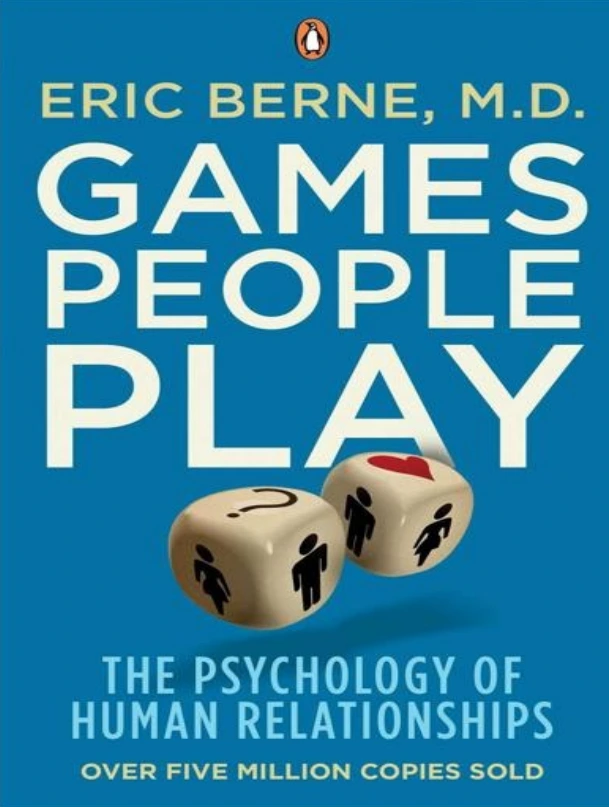
Games People Play reveals the hidden psychological games people engage in daily. Eric Berne explains how these destructive patterns create false emotional payoffs and prevent genuine connection. By understanding ego states and life scripts, readers learn to recognize and stop harmful interactions—at work, in relationships, and within themselves. This classic guide empowers you to live consciously, not reactively.
Games People Play is a groundbreaking book in the field of transactional analysis , written by psychiatrist Eric Berne .
This book explores how people interact through hidden psychological games —patterns of behavior that seem normal on the surface but are actually manipulative and emotionally damaging over time.
Berne defines a “game” as:
“A set of actions and reactions that appear honest but hide ulterior motives.”
These games often end with emotional pain, confusion, or loss—but they serve a purpose for those playing them: to gain strokes (recognition), avoid intimacy, maintain a familiar psychological position, or reinforce one’s life script .
“The payoff of every game is a confirmation of the player’s worldview and a reinforcement of their ego.”
This summary will walk you through the core ideas of Games People Play , helping you recognize unhealthy patterns in your own relationships and interactions.
In transactional analysis, a psychological game is a repetitive, devious, and often unconscious interaction between two or more people that leads to a predictable and unpleasant outcome .
Unlike healthy communication, these games have three key features:
Key Insight: We play games not because we’re evil—but because we’ve learned to protect ourselves by hiding our true feelings.
Berne breaks down each game into three stages:
Example:
Important Lesson: Many people act out childhood patterns without realizing it.
Berne outlines dozens of psychological games. Here are some of the most well-known:
Someone presents a problem, listens to solutions, and rejects all of them. This game avoids responsibility and keeps the person stuck in victimhood.
“Why don’t you try talking to him?”
“Yes, but he never listens anyway.”
Used when someone waits for another to make a mistake and then punishes them harshly—justifying it as justice or fairness.
Often seen in workplace conflicts, legal disputes, or parental discipline.
One person invites criticism or punishment by acting helpless, clumsy, or provocative.
Example: A student consistently forgets homework to get attention—even if it’s negative.
Dramatic displays of emotion to gain sympathy or manipulate situations.
Often used in families or workplaces to shift focus away from real issues.
Pretending to work hard at solving a problem, but secretly ensuring failure—so blame can be shifted elsewhere.
Used by people who fear success or feel unworthy of happiness.
Not necessarily about alcohol—it’s about using a self-destructive pattern to justify failure or gain attention.
This game often ends in dramatic consequences that “prove” the person is a victim.
Key Insight: These games may provide short-term psychological relief—but they damage long-term relationships and personal growth.
At the heart of the book is Transactional Analysis (TA) , which Berne developed to explain how people communicate and relate.
He identifies three ego states:
Healthy communication happens in the Adult-to-Adult mode. Most games arise from Parent-Child or Child-Child interactions.
Important Lesson: Recognizing ego states helps you break free from destructive cycles of interaction.
Berne explains that games fulfill hidden psychological needs:
Many games originate from childhood coping mechanisms and are replayed unconsciously throughout life.
“People play games because they believe they’ll win something important—even if it feels bad.”
Berne shows how games aren’t limited to personal relationships—they also show up in professional settings:
Understanding these dynamics helps leaders foster healthier communication and reduce toxic office politics.
Key Insight: Healthy leadership means recognizing and stopping games before they escalate.
Some of the most painful games happen in intimate relationships:
A couple pretends to be deeply in love while secretly maintaining emotional distance.
One partner constantly makes mistakes and apologizes profusely—then repeats the behavior, gaining sympathy and avoiding real change.
Used to justify failure or unhappiness by blaming a partner.
“If it weren’t for you, I’d be successful/happy/famous.”
These games keep people trapped in cycles of blame and manipulation.
Important Lesson: True intimacy requires honesty—not drama.
While the book was published in 1964, its insights remain relevant today.
Here’s how to apply the lessons of Games People Play :
Learn to spot when conversations turn manipulative or circular.
Are you the Persecutor? The Victim? The Rescuer?
Break the cycle by refusing to take the bait. Respond from your Adult ego state.
Move toward open, honest dialogue instead of hidden agendas.
Ask: What is this person trying to get from the game? Attention? Control? Validation?
We all have unconscious life scripts formed in childhood. Rewriting yours stops the need to play games.
“When you stop playing games, you start living authentically.”
Although not directly named by Berne, his work inspired the later concept known as the Drama Triangle , which aligns perfectly with his theories.
This dynamic fuels many of the games Berne describes.
Key Insight: Stop identifying with roles and start taking responsibility.
Berne offers practical tools to move beyond destructive patterns:
“You were taught how to behave—you can unlearn it.”
By becoming aware of your own patterns, you can begin to change them.
Games People Play is more than a psychology book—it’s a wake-up call to examine how we interact with others.
It teaches that:
As Berne writes:
“Winning isn’t everything—it’s the only thing… unless you want to grow up.”
Learning to stop playing games—and encouraging others to do the same—is one of the most powerful ways to build better relationships, stronger teams, and a more fulfilling life.